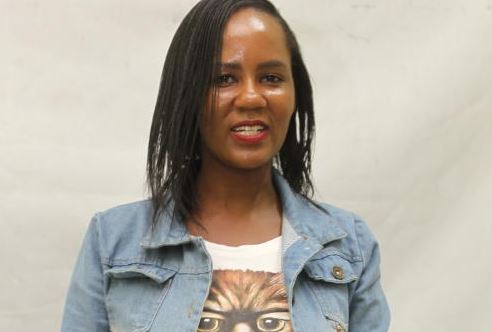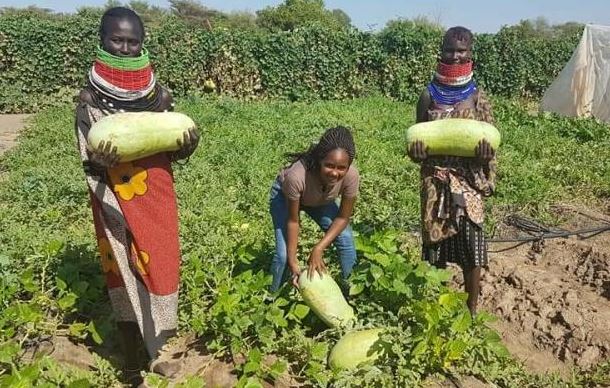
Agronomist Rachael Ngina all through an interview. [Jonah Onyango, Standard]
Rachel Ngina has smitten social media buyers with her farming expertise in Turkana County.
Still, six many years back, experienced an individual suggested that she would be exceptional at farming she would have laughed it off.
Ngina grew up in Kayole – enclosed by the concrete jungle that is Nairobi Metropolis. Farming was as alien to her as Kayole would be to a countryside indigenous.
Just after substantial college she needed to research commerce at college.
“I was likely in as a typical scholar. I experienced 39 factors. But to examine commerce I wanted 40,” she claims.
Agricultural programs ended up inside of access while. Instead of missing out absolutely on a university education and learning she resolved to apply to study horticulture at Egerton University.
Horticulture sounded feisty and less farm intense. Only for her to discover in the initially handful of weeks that as section of the curriculum she would be compelled to carry out true farming pursuits these as tilling land, weeding, pruning and so on.
“I did not want to do that sort of do the job. I had never ever pictured myself doing that. I realized appropriate absent that I wouldn’t endure,” she says.
She jumped ship and moved to Agribusiness. “I explained to myself that I would be high-quality with organization in agriculture but not the genuine farming,” she claims.
In 2017, Ngina was recognized into a review programme – intended for agricultural students – at the Arava International Centre for Agricultural Instruction (AICAT) in Israel.
“I deferred my past semester at college in 2018 to attend the programme.”
For 11 months she studied how to mature crops like onions, pumpkins, pomelos, watermelons and a handful of much more – beneath dry situations.
Why was she interested in the programme? She way too does not know.
She on the other hand did meet up with her obligations as a college student: attending class and even carrying out farm operate. For this, she would acquire a diploma in general agriculture.
Ngina arrived again property, from Israel, in June 2019. She took a two-7 days rest then took off to Turkana.
“In Turkana I was signing up for an Israeli NGO, linked to AICAT, that aims to assistance Turkana individuals triumph over food stuff insecurity,” she suggests.
It has been far more than a 12 months considering the fact that Ngina went to Turkana. She is loving every single little bit of her operate. Ironically, a large component of it entails true farming: tilling with a hoe, slashing with a panga, breaking really hard earth with a forked jembe and so on.
“I now really like it,” she states, not positive particularly why she abhorred it in her previously several years.
Ngina is 25. She is shorter and slender in stature but perfectly-endowed in the brain. She is a volunteer with Furrows in the Desert – the NGO.
Her function includes training Turkana people on how to excel in farming food items crops in spite of the harsh climate.
“I grew up watching news of hunger in Turkana. You point out Turkana and the initial point that comes to brain is men and women dying simply because they cannot accessibility foodstuff.
“Israel taught me that farming is not dependent on the local climate. The full of Israel is a desert – with typical daytime temperatures nearing 50°C.
“Everything that grows in Israel is watered and tended to expertly. The region is food items sufficient.
“Turkana, in contrast to Israel, is a significantly-improved area to do farming taking into consideration that in some Israel imports soil on which they do farming.
“When I made a decision to go to Turkana I strongly felt that locals would reward from what I experienced learnt about farming when at AICAT,” she claims.
Dryland farming, she claims, is not only feasible: it is currently being completed in numerous pieces of the globe.
Element of her get the job done in Turkana is to demonstrate to the persons just how to get it done. This is how she states it is accomplished.
You need drinking water
Arid and semi-arid areas (ASAL) in Kenya put up with water scarcity. Crop farming is impossible without having drinking water.
“Water is critical for lifestyle. All living matters need to have water to expand and keep alive. Just like human beings are unable to are living devoid of h2o so do crops,” Ngina says.
In ASAL areas resources of h2o can be streams and rivers. But these are frequently seasonal. Wells have established helpful at moments but they can only generate so a great deal drinking water.
The most effective water resolution, Ngina says, would be a borehole: hundreds of meters below the ground. Boreholes generate heaps of drinking water 12 months spherical.
In Turkana, Furrows in the Desert have partnered with St. Paul’s Missionaries, who Ngina says settle properly trained farmers and dig boreholes for them.
“The charge of digging a borehole is superior: the ordinary individual wouldn’t find the money for it. That is in which organisations like St Paul’s Missionaries come in,” Ngina says.
Get yourself drip irrigation process
Furrows in the Desert, Ngina says, delivers totally free training on crop production to the persons of Turkana. Every trainee, on finishing the system, is gifted with a entire irrigation kit.
“The kit includes a pump, basic safety gear, drip irrigation pipes and a storage tank,” she claims.
Drip irrigation, she states, delivers the specific amount of h2o wanted by the crops. The water is also sent immediately to the plant and thus wastage is considerably minimized.

Be lively and hands-on. Really don’t be lazy
You want to enjoy big from a farm in ASAL parts? You improved be prepared to put in the hrs.
Dryland farming, Ngina states, calls for that the farmer exhibits devotion. “You have to be there by yourself you can not shell out someone else to do the task for you,” she states.
The management and get the job done necessary in dryland farming is each critical and time consuming. One particular can not manage to be lazy.
Laziness – which Ngina aptly refers to as couch established farming – will unquestionably lead to failure. At AICAT, she states, students attended course in just one day. The rest of the days understanding took position at the farm.
“All of us were being to report to the farm by 5.30am in the morning,” she suggests. “We would do the job on the farm for near to 10 hrs. All people, such as our supervisors, had been envisioned to function at the farm.”
Acquiring witnessed Israeli farming ethics, Ngina is persuaded that the motive several farmers fail in Kenya is mainly because they do not want to sweat for it.
Check with for skilled aid
In accordance to Ngina, professionals – such as agronomists – are vital specifically in dryland farming.
“As an agronomist I have an understanding of how even slight climate alterations could price tag me the full crop. It is significant for a dryland farmer to consult an agronomist when predicaments arise wherever they do not know what to do,” she says.
Agronomists, she states, suggest on appropriate spacing, state of soil wellness and fertility, water demands, irrigation, sickness handle and several other facets of farming.
In Turkana, just one of the classes Ngina is training her students is biological pest command. Turkana is a source scarce ecosystem the place this sort of competencies would appear in handy.
Develop the correct crop
Not just about every crop will expand in dry places even when provided with h2o, Ngina states. It is vital that a farmer is thoroughly suggested – information of which is obtainable with county governments – on which crops to plant.
“Even when purchasing seeds, request for seeds intended for the local weather and soil wherever you are likely to plant your crops,” she explains.
Until it is impossible, Ngina advises, it would be fantastic exercise to do soil screening to build soil wellbeing and soil fertility which would then notify what crops can be developed in the space.





















